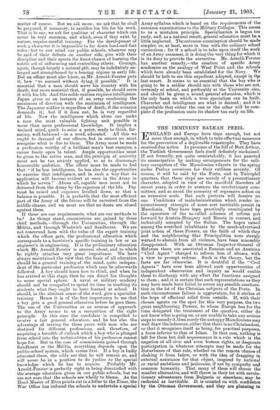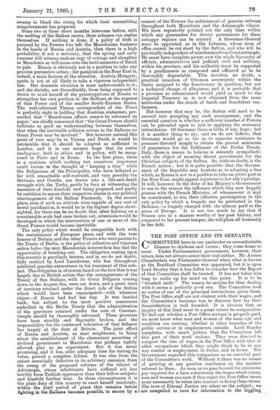more than enough, in which to take effectual measures for
the prevention of a deplorable catastrophe. They have received due notice. In presence of the fall of Port Arthur, the Turkish Government feels itself definitely unchained. If not formally, yet quite unmistakably, it has asserted its emancipation by making arrangements for the mili- tary occupation of the Macedonian vilayets in the spring under Pashas notorious for their ruthless severity. Of course, it will be said by the Porte, and in Turcophil quarters, that these steps are merely of a precautionary character, adopted in view of the manifold disorders of recent years, in order to overawe the revolutionary com- mittees, and so avoid the necessity of repressive action on an extensive scale. But such pretexts will deceive no one. Conditions of maladministration which render in- surrectionary attempts of some sort inevitable persist in Macedonia. They have been practically unmitigated by the operation of the so-called schemes of reform put forward by Austria-Hungary and Russia in concert, and technically accepted by the Sultan. The hopes raised among the wretched inhabitants by the much-advertised joint action of these Powers, on the faith of which they and the neighbouring Slav Principalities were sternly warned to abstain from all violence, have been miserably disappointed. With an Ottoman Inspector-General of Reforms there are associated a Russian and an Austrian " Civil Agent " charged to inform him of abuses, with a view to prompt redress. Such is the theory, but the facts are far otherwise. It is doubtful if the " Civil Agents " have ever been allowed such opportunities of independent observation and inquiry as would enable them to discharge with any effect the functions assigned to them ; and it is certain that such representations as they may have made have failed to secure any sensible ameliora- tion in the lot of the Christian subjects of the Porte. In such circumstances failure is aggravation, for it strikes at the hope of effectual relief from outside. If, with their chosen agents on the spot for this very purpose, the two great neighbouring Powers, to whom Europe has for the time delegated the treatment of the question, either do not know what is going on, or are unable to take any serious steps to remedy it, then surely the unhappy Macedonians may well draw the inference, either that there is no Christendom; or that it recognises itself as being, for practical purposes, a force inferior to that of Islam. In that case, nothing is left for them but dull acquiescence in a rule which is the negation of all civic and even human rights, or desperate participation in whatever attempts may be made for the disturbance of that rule, whether on the remote chance of shaking it from below, or with the idea of dragging in external assistance for that object, inspired by national or racial ambitions and jealousies, if not by sympathy and common humanity. That many of them will choose the manlier alternative, and will throw in their lot with revolu- tionary adventurers from Bulgaria or elsewhere, may be reckoned as inevitable. It is counted on with confidence by the Ottoman Government, and they are planning to Some two or three short months intervene before, with the melting of the Balkan snows, these schemes can realise themselves. If nothing is done, if a policy of drift is pursued by the Powers who left the Macedonian business in the hands of Russia and Austria, then there is a high probability, if not a certainty, that the spring and early summer will witness such an orgy of outrage and slaughter in Macedonia as will cause even the lurid memories of Batak to pale. Russia is obviously not in a position to take any genuine preventive action ; her paralysis in the Near East is, indeed, a main feature of the situation. Austria-Hungary, again, is not at all likely to take a vigorous independent line. Her domestic situation is most unfavourable to it ; and she shrinks, not discreditably, from being supposed to desire to avail herself of the preoccupations of Russia to strengthen her own position in the Balkans at the expense of that Power and of the smaller South-Eastern States. The well-informed Vienna correspondent of the Times is probably right in holding that Austrian statesmen, per- suaded that " Macedonian affairs cannot be reformed on paper," are chiefly concerned that "the Great Powers should cultivate so good an understanding between themselves, that when the inevitable collision occurs in the Balkans no Great Power may be involved." But however natural this point of view may be in Vienna and Pesth, it would be intolerable that it should be adopted as sufficient in London, and it is our earnest hope that its entire inadequacy, both in ethics and in policy, will be recog- nised in Paris and in Rome. In the first place, there is a cynicism which nothing but conscious impotence could excuse in the thought of " keeping a ring " while the Bulgarians of the Principality, who have behaved so far with remarkable self-restraint, and very possibly the Servians and Greeks, are drawn into a life-and-death struggle with the Turks, partly by fury at witnessing the massacre of their kinsfolk now being prepared, and partly by ambition to secure their respective shares in any political rearrangement of the Balkan Peninsula. In the second place, even if such an attitude were capable of any sort of moral justification, it would be in the highest degree short- sighted, for there can be no doubt that after fighting on a considerable scale had once broken out, situations would be developed in which the intervention of one or more of the Great Powers would become inevitable.
The only policy which would be compatible both with the maintenance of European peace, and with the true honour of Britain and the other Powers who were parties to the Treaty of Berlin, is the policy of collective and vigorous action before the next Macedonian insurrection has had the opportunity of breaking out. The obligation resting upon this country is peculiarly intense, and is, we do not doubt, fully realised by Lord Lansdowne, who has throughout exhibited genuine earnestness in his treatment of this sub- ject. The obligation is, of course, based on the fact that it was largely due to British action that the arrangements of the Treaty of San Stefano, with its Great Bulgaria coming down to the Aegean Sea, were cut down, and a great tract of territory retained under the direct rule of the Sultan which would have been emancipated—with whatever object—if Russia had had her way. It was handed back, but subject to the most positive assurances embodied in the Berlin Treaty that the administration of the provinces retained under the rule of Constan- tinople should be thoroughly reformed. These promises have been steadily and flagrantly broken, and the responsibility for the continued toleration of that defiance lies largely at the door of Britain. The joint effort of Russia and Austria, as near neighbours, to bring about the establishment of the elementary securities of civilised government in Macedonia was perhaps rightly allowed play as an experiment. But it was never promising, and it has, after adequate time for testing its value, proved a complete failure. It was also from the outset essentially defective in its arbitrary omission from the sweep of the proposed reforms of the vilayet of Adrianople, whose inhabitants have suffered not less terribly from Turkish oppression than their fellow-subjects and kinsfolk further west. In these circumstances it is the plain duty of this country to exert herself resolutely, within the brief period of grace that remains before fighting in the Balkans becomes possible, to secure by a concert of the Powers the enforcement of genuine reforms throughout both Macedonia and the Adrianople vilayet. We have repeatedly pointed out the only lines within which any guarantees for decent government for these unhappy regions can be secured. A Governor-General must be appointed, as in the Lebanon, whose term of office cannot be cut short by the Sultan, and who will be practically independent of interference from Constantinople. He must have complete power over the whole hierarchy of officials, administrative and judicial, civil and military, within his province, and his authority must be supported by a gendarmerie so composed and officered as to be thoroughly dependable. This involves, no doubt, a practical cessation of Ottoman sovereignty within the limits assigned to the functionary in question, but not a technical change of allegiance, and it is probable that a province so administered would yield as much to the Imperial Treasury as is now obtained from the same territories under the clutch of harsh and fraudulent tax- farmers.
But however that may be, the Sultan will need to be coerced into accepting any such arrangement, and the essential question is whether a sufficient number of Powers can be prevailed upon to join in applying the necessary intimidation. Of Germany there is little, if any, hope ; but it is another thing to say, and we do not believe, that Germany would go so far as to organise resistance to pressure directed simply to obtain the proved minimum of guarantees for the fulfilment of the Berlin Treaty. Italy, there is reason to believe, is sincerely sympathetic with the object of securing decent government for the Christian subjects of the Sultan. So, without doubt, is the French nation ; but it is quite possible that the Govern- ment of the Republic may hesitate as to adopting a line which, as Russia is not in a position to take an active part in the Near East, might appear injurious to her ally's prestige. It will, however, be the duty of his Majesty's Government to use to the utmost the influence which they now happily possess with the French Ministry, of whomsoever it may be constituted, to win their ;effective participation in the only policy by which a tragedy can be prevented in the Balkans,—a tragedy charged with the utmost peril to the peace of Europe. It is not too much to say that if France acts in a manner worthy of her past history, and congenial to her present temper, she will place all humanity in her debt.







































 Previous page
Previous page